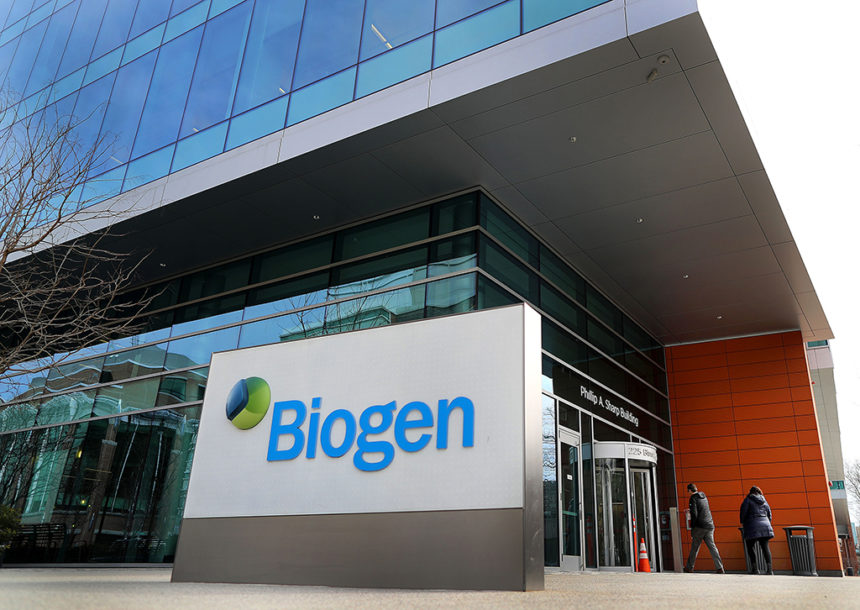In a pair of earnings reports released Wednesday, Biogen topped analyst expectations with its latest quarterly numbers while Roche saw its sales fall.
While Biogen’s total revenue dropped 7% to $2.2 billion, its GAAP operating income grew 10% and its non-GAAP diluted earnings per share (EPS) rose 8% to $3.67 in Q1.
Analysts had pegged Biogen’s quarterly revenue to be around $2.32 billion with adjusted earnings of $3.44 per share.
Among its various divisions and products, most industry watchers were keen to see how Leqembi, its Alzheimer’s treatment developed in conjunction with Eisai, performed.
The Food and Drug Administration-approved drug achieved global in-marketing sales of $19 million, well outpacing the $7 million of sales in Q4 2023. The company said a “significant increase” in new patient starts last month contributed more than 20% of patients now on Leqembi.
In addition to Leqembi, Biogen’s postpartum depression drug Zurzuvae generated $12 million in quarterly revenues, topping the $2 million it brought in last quarter. Products like Skyclarys and Spinraza also grew, with the former treatment generating $78 million in revenue.
By segment, the drugmaker’s multiple sclerosis revenue and rare disease revenue both fell 4%, though its biosimilars revenue inched up 2%. Other product revenue hit $15 million.
In light of the solid top line performance, Biogen reaffirmed its full-year financial guidance.
“We are starting 2024 with an increase in earnings per share and solid execution across our new product launches along with the realization of meaningful cost savings and margin improvement,” Biogen CEO Christopher A. Viehbacher said in a statement. “We see momentum building at a steady pace for Leqembi. In particular, we were encouraged that Leqembi in-market revenue for the first quarter nearly tripled sequentially and we saw a significant build in month-to-month new patient starts in the first quarter. As the launch progresses and infrastructure develops, we continue to believe in the potential longer-term commercial opportunity in Alzheimer’s disease. In rare disease, the U.S. launch of Skyclarys is advancing well and with the E.U. launch underway, we are beginning to realize the value of the Reata transaction. The uptake of Zurzuvae in postpartum depression and Qalsody in SOD-1 ALS, two areas of significant unmet need, has also been encouraging. With a renewed culture focused on purpose and performance, we are advancing toward our goal of returning to sustainable growth while creating enhanced value for patients and our shareholders.”
As it relates to personnel developments at the company, Biogen’s chief medical officer Maha Radhakrishnan left the company after four years this spring.
Meanwhile, Roche’s group sales fell 6% in Swiss francs (CHF) due to the appreciation of the currency against other currencies. When reported at constant exchange rates, Roche’s group sales rose 2% during the quarter and 7% once COVID-19 products were excluded.
Sales from the Swiss giant’s pharmaceuticals division and its diagnostics unit both fell 6% at CHF.
Joseph Jacob, a healthcare analyst at Citeline, noted in written commentary to MM+M that Roche has had a shaky start to the year, with declining results largely fueled by a depreciation in the Swiss franc and a fall in COVID-19-related products.
“The loss of exclusivity of Avastin, Herceptin and Rituxan, along with the sales loss of Ronapreve for COVID-19, were offset by a growth in the pharmaceutical division, signifying a 2% growth in sales, while the diagnostic division base grew 8%,” he wrote. “Ocrevus and Hemlibra have continued to boost sales, having racked up sales of 1658m CHF and 1040m CHF, respectively. Ocrevus is expected to continue its market dominance and expand market share once its subcutaneous version is launched and Vabysmo’s unprecedented growth has marked its place among the fastest-growing products for Roche. Vabysmo, highlighted by its dual mechanism of action, is quickly becoming a top choice in ophthalmology, competing directly with Eylea. A similar uptake is also seen with Phesgo, showcasing a 70% growth rate.”
Still Jacob wrote that the fiscal year looks promising for the company due to increasing demand for key products. Looking ahead, Roche continues to expect an increase in group sales in the mid-single digit range at CER.
During his first year at the helm, CEO Thomas Schinecker received 9.6 million CHF — $11 million — in total compensation. A prominent development was the nearly $3 billion acquisition of Carmot Therapeutics, which he told Bloombergcould be bolstered by additional, larger deals in the coming months.
To that end, Roche recently announced Lonza would buy one of its largest manufacturing sites for biologic drugs for $1.2 billion.
In regards to other recent company news, Roche has made a series of announcements related to the clinical and regulatory progress of a number of treatments.
Roche unveiled promising Phase Ib/IIa data for trontinemab, an investigational Alzheimer’s therapy.
As part of a Phase 2 trial, Roche and Alnylam Pharmaceuticals announced their experimental drug against high blood pressure was shown to work when used in combination with the standard of care.
The FDA also granted a breakthrough device designation to Roche’s Elecsys pTau217 plasma biomarker assay.
When it comes to external views of the drugmaker’s quarterly performance, reactions were mixed. J.P. Morgan maintained its Sell rating, Jefferies reaffirmed its Neutral rating and Bernstein gave a Buy rating.
In addition to Biogen and Roche, both Thermo Fisher Scientific and Ipsen reported their latest earnings reports Wednesday morning as well.
To read a May 2024 article about Biogen buying Human Immunology Biosciences in a deal worth up to $1.8B, click here.







